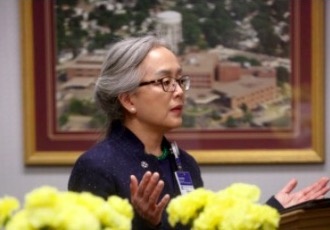The Master of Arts in Pastoral Care and Counseling (MAPCC) Chaplaincy and Spiritual Care track is designed to help students increase and deepen self-awareness; develop skills training in interpersonal, contextual, and institutional engagements; and acquire foundational knowledge that can all be deployed for effective chaplaincy and spiritual care practice across a variety of contexts—hospital, military, movement, prison, hospice, first responder, campus, and urban ministry.
The MAPCC Chaplaincy and Spiritual Care track is a 48-credit hour hybrid degree track where students can complete nearly all of their required coursework online without needing to move to Evanston/Chicago area.
Within the requirements of the program are a short, intensive cohort retreat, and two weeklong in-person intensives during the second year of the program – one during the Fall semester and one during the Spring semester.
Students will be able to complete their Clinical Pastoral Education (CPE) requirements in the area where they live (contingent on being able to find an appropriate CPE placement).
Foundational Courses (18-credit hours)
Concentration Courses (30-credit hours)
CPE is an accreditation and training program that teaches students how to provide spiritual care in clinical settings like hospitals, nursing homes, prisons, and addiction treatment centers. A significant part of one’s theological education, CPE provides a learning situation for a student in which they may develop awareness of the theological and psycho-social concerns of persons in crisis.

The MAPCC Chaplaincy and Spiritual Care track fulfills the academic requirements for associate certified chaplain certification through Board of Chaplaincy Certification Inc. (BCCI), an affiliate of the Association of Professional Chaplains.
The BCCI® certification program is designed to elevate professional standards, enhance individual performance and designate professional chaplains who demonstrate the knowledge essential to the practice of chaplaincy care. Chaplains are certified as board certified chaplains (BCC) or associate certified chaplains (ACC) according to established national qualifications, including a code of ethics.
Please note: completing the MAPCC Chaplaincy and Spiritual Care program does not grant you certification as an associate certified chaplain.
Students can round out their Master of Arts degree with the Master of Divinity degree. The MDiv/MA allows students to become specialists in the area of their MA degree while broadening their theological, spiritual, and leadership foundations through the Master of Divinity.
Garrett offers courses in a variety of course modalities to meet a variety of scheduling needs. Course options include in-person, online, hybrid, hyflex, and more. While the program is taught by faculty of Garrett, students may also take courses at Northwestern University and at any of the Association of Chicago Theological Schools (ACTS) in the Chicago metropolitan area.
The MAPCC Clinical Track is best suited for students who are interested in licensure as a professional counselor.
Graduates of this program will be able to:
Garrett-Evangelical accepts applications from students with a minimum GPA of 2.5 in a bachelor’s degree from an accredited college or university or from an AETH-certified Bible institute. Because our primary language of instruction is English, applicants be able to show English proficiency, as evidenced by a previous degree in English or completion of either the Duolingo or Test of English as a Foreign Language test.
Applications are reviewed on a rolling basis. International student applications are due by March 1st.